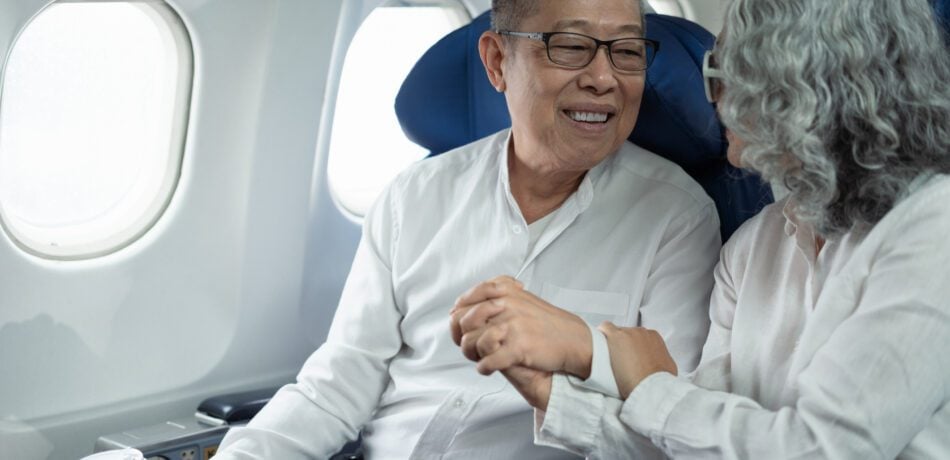Travel season is in full swing! Are you preparing to visit somewhere fabulous? Planning an itinerary, making reservations and packing a bag aren’t the only preparations you need to make. It’s also important for seniors to make special plans and considerations for staying healthy while traveling. Check out these six tips that can help you enjoy a healthier, more comfortable experience.
1. Schedule a Check-Up With Your Doctor
Before you jet set on your adventure, schedule an appointment with your doctor. Check out the CDC’s Destinations website for information about vaccines or medicines you may need and what health risks are a concern at your destination. Let your doctor know your travel plans and discuss if any of your chronic health conditions or ailments could be impacted. Discuss your prescription medications and get a doctor’s note about your medications and health conditions.
2. Make a Plan for Your Medications
Remember to always keep your medications with you in your carry-on bag. Also keep your doctor’s note in your carry-on.
It’s important to stay on your regular medication regimen, so be prepared to take medications in-flight if necessary or at proper times if crossing time zones.
Check out TSA’s website for more information about traveling with medications. Keep in mind that TSA allows you to travel with reasonable quantities of liquid medications, but you must tell the officer about them at the start of the screening checkpoint. And TSA doesn’t require medications in prescription bottles, but some states have individual laws regarding the labeling of prescription medications.
If you’re traveling internationally, there are additional considerations to make. Some medicines that are over the counter in the U.S. might be considered controlled substances in other countries, and counterfeit drugs are common in some countries, so it’s important to pack enough for your trip. Check out this CDC resource for the information you need.
Related: 5 Surprising Reasons to Take Your Vacation and 3 Low-Cost Ways to Do It
3. Pack a First Aid Kit
In addition to your regular medications, it’s important to pack first aid supplies, especially if they will be difficult to find at your destination. Stock your kit with essentials for upset stomach and headache, plus bandages, hand sanitizer and sunscreen. Also include copies of your prescriptions and emergency contact information. Check out this comprehensive packing list from the CDC.
Guaranteed Acceptance Life Insurance
Coverage options starting at $9.95 a month!
Guaranteed acceptance life insurance without medical exams, health questions, or rate increases.
4. Consider Your Health Insurance
If you have Original Medicare, rest assured that your coverage is good in all 50 states plus all U.S. territories. However, if you’re traveling abroad, Original Medicare won’t pay your health expenses except for a couple exceptions. Many Medicare Supplement insurance plans do provide foreign travel benefits, though.
If you have Medicare Advantage, emergency and urgent care needs should be covered anywhere in the U.S. However, standard coverage isn’t available outside your service area, and plans generally don’t cover medical care outside the U.S.
No matter what coverage you have, research the details of your policy before you travel so you understand your benefits and can be prepared. For some people, travel insurance with health benefits can help provide peace of mind.
Check out this resource from Medicare.gov for more information.
5. Stay Safe & Comfortable in the Air
One of the biggest health risks for senior travelers is deep vein thrombosis (DVT). Airplane travel, especially flights longer than four hours, can increase your risk for blood clots. You can help prevent blood clots by standing up and walking around every couple hours. Exercise your calf muscles and stretch your legs while sitting. You can also wear compression socks and talk to your doctor about medications you may take if you’re at risk. Flying can be dehydrating so be sure to drink enough water.
Healthy snacks, a sleep mask, noise reducing headphones and a travel pillow can also help you feel more comfortable on flights.
6. Ask for Help
If you have trouble walking long distances, you can request a wheelchair or cart when booking your flight, or you can ask for assistance when you arrive at the airport.
Also ask for help at security. Let TSA know about any medical issues you have at the start of the checkpoint so they can better accommodate you. For example, if you have a medical device like a pacemaker, it’s important to let them know as a pat-down may be better for you than the scanner.
Bon Voyage!
Traveling requires a lot of planning, but with the proper precautions, you’ll set yourself up for a stress-free, enjoyable experience.
Trying to decide where to travel? Check out recommendations!
- 6 Places to Travel During the Off-Season
- 8 Destinations That Feel International—but Don’t Require a Passport!
Colonial Penn is here for you!
Colonial Penn has specialized in making life insurance simple and accessible by offering it directly to consumers since 1957. Click here to learn more.
Colonial Penn is a private company that is not Medicare, Medicaid or MaineCare and is not a governmental agency





